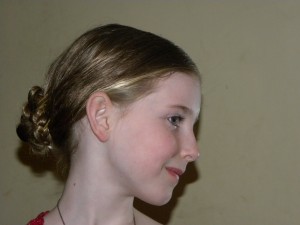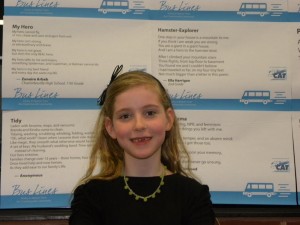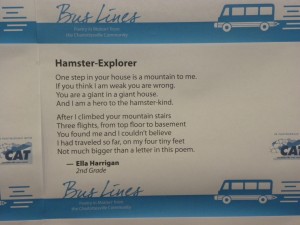My review of Sudden Flash Youth: 65 Short Short Stories, edited by Christine Perkins-Hazuka, Tom Hazuka, and Mark Budman, appears in issue 7 of
Prime Number magazine.
The Wilding by Benjamin Percy
My review of Benjamin Percy’s 2010 novel, The Wilding, appears in issue 7 of
Prime Number magazine.
Transactions in a Foreign Currency by Deborah Eisenberg
On April 13, 2011, my review of Deborah Eisenberg’s wonderful first book, which is part of her newest work, Collected Stories, appeared in The Rumpus. Here is the link:
The Rumpus
Poetry on the Bus
“I’ve never won anything before,” Ella said. “Not in my whole life.” Seven entire years. “Not even a raffle.” When she got the good news, about a month ago, one of her first questions was, “What will I wear?” (And who will you thank? I wondered. At the Oscars, the winners always acknowledge their mothers.)
“Only 36 poems won,” Ella told all her friends after that, “out of 160.” Her poem, written on the theme “heroes,” is called “Hamster-Explorer.” Its ten lines about a fearless, furry rodent, are on display to fearless city bus riders throughout Charlottesville.
The transit center, where the reading took place, was standing-room only. The age range was first grade through retirement, dominated by high schoolers. The youngest boy wrote about his teacher, who stood next to him. One man, who is a three-time winner, introduced himself as “chronologically mature.” His poem was about his parents—four years of education between them, raising five African American children in the deep South in the 40s—as his heroes.
One of my neighbors and a wonderful writing teacher at WriterHouse, Carey Morton, read a surprising poem about a feisty neighbor (not me!). Sarah Crossland, who was in a class with me at the University of Virginia, read a lovely poem about her grandmother, likening her hands to mother of pearl. Grandparents and parents dominated as heroes. (No need for an Oscar-style thank-you speech; the gratitude is embedded in the poem.) Some of the high school readers seemed surprised at the earnestness of their words, as if they had been outed as closet sentimentalists.
Susan Berres, the organizer, said, “What I love about poetry is its accessibility. Everybody’s got time to write ten lines.” You might not be able to commit to National Novel Writing Month in November. But a poem can be pieced together in snippets, like Frank O’Hara’s nervy and elegant Lunch Poems (written on his lunch hour). I loved the community feel of this event, of poetry not as elitist, but populist fun.
Valentine’s Dance
 For the second year in a row, my husband James took our seven-year-old daughter Ella to the Father-Daughter Valentine’s Day dance, sponsored by the Charlottesville Parks and Recreation Department. It’s a popular affair, with room for only the first 200 couples, and it sells out quickly. For $10 a couple, you can twirl your girl on the heart-bedecked dance floor to the rhythms of Justin Bieber, the Hokie Pokie, the chicken dance, and the Macarena, plus feast on cupcakes, pretzels and drinks. Each girl goes home with a box of chocolates and a red carnation.
For the second year in a row, my husband James took our seven-year-old daughter Ella to the Father-Daughter Valentine’s Day dance, sponsored by the Charlottesville Parks and Recreation Department. It’s a popular affair, with room for only the first 200 couples, and it sells out quickly. For $10 a couple, you can twirl your girl on the heart-bedecked dance floor to the rhythms of Justin Bieber, the Hokie Pokie, the chicken dance, and the Macarena, plus feast on cupcakes, pretzels and drinks. Each girl goes home with a box of chocolates and a red carnation.
There is no dress code, but even the men go formal. Almost every dad wears a tie, and a few are in tuxedos. The girls decorate themselves in dresses as red as the red velvet cupcakes, some with hair in pink ribbons, swirled on top of their heads like frosting.
But what’s remarkable about the event is how racially and economically integrated it is. Or rather, what’s remarkable about most events we go to here is how much they are not.
Social segregation is still a problem all over the country, including in Brooklyn, where we lived until a couple years ago (all you have to do is watch a Spike Lee film to prove that point.) But here in the South, where school integration is something of recent memory, it has a different emotional resonance.
Charlottesville is a progressive college town, and 80 percent of us voted for Barack Obama. But we are surrounded by the remnants of our history. Only an hour to the east is the capitol of the Confederacy during the Civil War, and our downtown showcases a park named after Robert E. Lee and a statue of Stonewall Jackson. You don’t have to drive far, maybe fifteen minutes south to Scottsville, to see Confederate flags on grand old porches.
Partly it’s our fault when we mainly see people like us. My daughter’s dance and French classes are expensive, as are my son’s saxophone lessons and the live music and theater performances we love. But everything we do doesn’t have to be like that.
Our family has choices, so we have chosen to put our daughter on the city municipal swim team, whose negligible entry fee makes it open to all, instead of a team at a fancy swim club. We send her to a public school with an award-winning black principal. We transferred our son from a mostly white private school to the public city high school, which is about half black and half white.
If we’re really lucky, our children will grow up–with a black president, principal, school board members, neighbors, and friends—in a much more integrated society than previous generations. We’ll reserve our daughter’s Valentine’s Dance tickets early every year and hope that the only colors she’ll be concerned about are red and pink.
Photo: Ella in her homemade updo ready for the dance
- « Previous Page
- 1
- …
- 23
- 24
- 25
- 26
- 27
- …
- 29
- Next Page »

